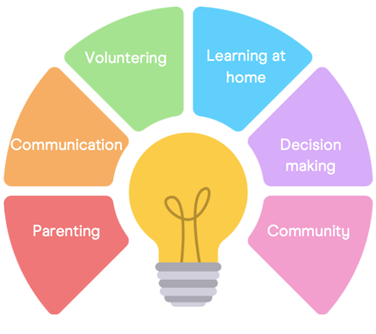
Engaging hard-to-reach parents: How to overcome 5 most common barriers
Communicating with the parents in your school can be a doddle. However, there is a significant difference between communication that ticks a box and effective, purposeful engagement with your school families.
This article explores the barriers found when engaging parents, plus 5 clear solutions to the most common challenges.
Who are the hard-to-reach parents?
"We know that levels of parental engagement are consistently associated with children’s academic outcomes. We also know that a parent’s job, education, and income matter less to their child’s development than what they actually do with them."
Sir Kevan Collins,
Chief Executive of the Education Endowment Foundation
Schools often target students based on whether they are disengaged, vulnerable, at risk of underperforming and gifted and talented. Each of these groups has specific goals and outcomes to reach their potential; staff are aware of the collective goals and what they, as teachers, need to do to achieve them.
But what about the parents? Do we ever think to categorise them in the same manner we do their children?
The hard-to-reach category is broad and woolly, potentially spanning from parents who do not recognise the importance school has on their child’s life chances, to those in incredibly high-pressured roles that take time priority over their child’s schooling progress.
As senior leaders, your role is to effectively engage all parents in school life, from all walks of life, all with different aims and barriers. Just as you differentiate for their children, you must think in a similar critical way when delving into why some of your parents are reluctant to engage in school life.
Some examples of passive engagement:
- No-shows at parent’s evenings.
- Not participating in own clothes day.
- Homework incomplete.
- Spellings not practised.
- Minimal reading practice at home.
Why is parental engagement so critical?
John Hattie suggested that parental engagement is equivalent to adding two to three years to that student’s education. Pre-pandemic, this was an undeniable advantage for the child’s progression academically. Factoring in the predicted lost learning between 2020-2021, our students need all the help they can get - with disadvantaged students losing out considerably more than others.
Parental commitment doesn’t just positively impact our students' academic progress; it holistically supports their progress. Although the government's recently proposed changes to schools focus heavily on attainment, there are invaluable social and emotional benefits available from an increased parental interest in the school community:
- Opportunities to develop self-confidence as supported by the parents.
- Encouragement in attending national tutoring catchup interventions.
- Access to home-intervention catchup.
- Positive family relationship building.
- Enrolment in after school clubs to develop friendships.
- Parental social support from other parents.
- A united front between home and school.
What are the types of parental engagement?
Research is available on the types of parental engagement experienced across schools, categorising into 6 key types:
 You can divide it further using the specific differences between home-based engagement (accessing online learning, practising homework) and school-based (parent's evening attendance, communicating with teachers).
You can divide it further using the specific differences between home-based engagement (accessing online learning, practising homework) and school-based (parent's evening attendance, communicating with teachers).
When delving into your own school’s parental engagement strategy, it is valuable to identify the demographic of parent types you have within your school community.
The parent constantly asking questions or having a concern about the choice of homework or learning opportunities their child is receiving can be a tough engagement type to support. However, by recognising this engagement type, it can be planned for.
So, for example, this particular parent type benefits from easily accessible information in advance of events, provided quickly and smoothly. The school office should need to have minimal contact with them, with any technical issues dealt with by your communication platform provider. This parent wants to be engaged but can be overzealous - yet ultimately their energy can be harnessed for the good of their child. You just need to be sure that there are no hiccups in the process - or complaints will follow!
5 common barriers to effective parental engagement and how to overcome them
Your priority as educators is always the students; their welfare and progression are the drivers of your decisions and initiatives. To add parents' interest and engagement levels on top of the already extensive responsibilities schools have can seem unreasonable. This is why it is important to quickly overcome the barriers to parents' interaction with the school.
Cost
Cost is often a forgotten barrier, as maintained schools and trusts are non-fee paying. However, what may seen like small costs to one parent (such as use of public transport or the price of petrol) could break the budget for another - particularly as the cost of living rises.
If a family has more than one child at school, the sums can multiply quickly. And, if one child is too young to bring along to school events, there is the cost of additional childcare. Then there is the cost of taking time of work - which isn't covered for many roles.
Providing parents with the tools to book timeslots which suit them is vital. And of course meetings can be held online, instead of in school, too.
Language and cultural barriers
An estimated 18% of pupils in UK schools have English as an Additional Language (EAL). In some cases students may have parents who understand very little English and may use friends, neighbours or family members (including the student themselves) as translators.
Having a communication system that has the option to be built in a language of your choice is a real bonus here.
Time and working life
A lack of time to meet with parents to discuss concerns or celebrations and attend sporting events or school community events can increase the lack of connection and ‘belonging’ within a school. Many schools report that their parents complain about the short time slots in parent’s evenings and the difficulties they have in being there on time.
The use of virtual interactions with a tailored celebration newsfeed can allow parents to stay engaged with the school during their working hours; and the introduction of virtual meetings can help those who cannot make it into the school building.
Poor school experience
A key barrier for parents to engage with schools can be their own negative school experiences when they were younger. School can be intimidating for many parents, with concerns over possible low academic levels and the daunting prospect of appearing inadequate.
Try introducing no-pressure school events where the parents have the potential to blend into the background: a walk around their classroom, a reading picnic, parent-child art lessons or light sports-related activities.
Parental anxiety
After nearly two years of unprecedented lockdowns, virtual learning and staying at home to stay safe many parents found the change back to ‘normal’ extremely challenging—increasing anxiety surrounding the school day and their child’s progress and safety.
Increased communication and the opportunity to ask questions both help to reduce anxious behaviour. However, two-way communication needs to be managed. Having a communications system where you can decide who can communicate with who is vital. A 'safe social-media' style newsfeed on your own communications app can also help with this - especially if it has the ability to turn parental comments on or off in just one click!
It is important to consider staff workload and wellbeing with comment features, explain clear expectations of replies or follow-ups within specific time frames and encourage your teachers to stick to these healthy boundaries.
6 steps to positive parental engagement
 There is a myth that positive parental engagement must mean a school has a dedicated person focused on covering all communication avenues possible—sending messages to parents, creating afterschool registers, booking onto extra-curricular clubs, transferring all important data onto the MIS, organising parent payments, and keeping the social media platforms updated - to name but a few.
There is a myth that positive parental engagement must mean a school has a dedicated person focused on covering all communication avenues possible—sending messages to parents, creating afterschool registers, booking onto extra-curricular clubs, transferring all important data onto the MIS, organising parent payments, and keeping the social media platforms updated - to name but a few.
This is not the case; highly technical apps are now available to give your engagement strategy wings without the human resources.
We have highlighted your first 6 steps in engaging those hard-to-reach parents.
Step 1
Create an engagement strategy (download your free Weduc in-depth White Paper on how to create an outstanding strategy here.)
Step 2
Discuss and agree on the vision and commitment of all team members, especially the Senior Team and Governors. This vision will underpin all decisions relating to parental interaction.
Step 3
Put energy into creating positive relationships with parents. Save your Twitter and Facebook self-promotion as only positive messages- mundane but important information on packed lunches and changes to sporting events can be via your Weduc app.
Step 4
Ensure all communication is worthwhile and in the child’s best interests (tailor their communication feed). The targeting feature of Weduc means that your communications only go to those parents it is aimed at; it also provides protection of images of students, so you can be sure they aren't shared with the wrong audience.
Step 5
Allow your diverse and inclusive underpinning to shine through your communication systems. Use a simple app that all families can access, with the option to create a custom app in a language of your choice.
The dedicated parent support provided by Weduc is also unique - meaning your parents get the technical help they need, freeing up your office staff from dealing with queries.
Step 6
Look outside the school - engage with community groups (nursing homes, litter picking, food banks) to help your understanding of the different communities within your school. Look for opportunities to link with parent businesses - via careers fairs and work experience - to ensure your students are connected with a diverse range of people.
Ready to re-evaluate how your communication system works for you and your families?
Book a quick chat with one of our team now.


